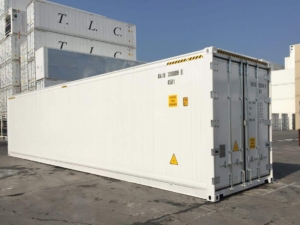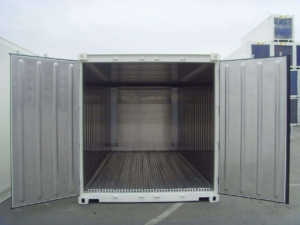Reefer containers, short for refrigerated containers, are a type of container used in the shipping industry to transport temperature-sensitive goods. These containers are equipped with a built-in refrigeration unit to maintain a specific temperature range, ensuring that perishable goods such as fruits, vegetables, pharmaceuticals, and chemicals remain fresh during transport. While standard reefer containers are widely used, special reefer containers offer unique features and capabilities that cater to specific needs and requirements. In this article, we will explore what special reefer containers are and how they differ from standard reefer containers.

Overview of Standard Reefer Containers
Standard reefer containers are typically 20 or 40 feet in length and are constructed from steel to provide strength and durability. They are heavily insulated to minimize heat transfer and maintain the desired temperature inside the container. The refrigeration system of a standard reefer container consists of a compressor, condenser, evaporator, and other components that work together to regulate the temperature.
Standard reefer containers are commonly used for transporting a wide range of perishable goods, including fruits, vegetables, meats, seafood, dairy products, pharmaceuticals, and chemicals. They are suitable for most general-purpose refrigerated cargo and are widely available from shipping companies and container leasing companies.
Special Reefer Containers: Features and Types
Special reefer containers, on the other hand, offer unique features and capabilities that cater to specific needs and requirements. These containers are designed to meet the demands of specialized industries and applications, providing enhanced functionality and performance compared to standard reefer containers. Some common types of special reefer containers include:
- High-Capacity Containers: High-capacity reefer containers are designed to accommodate larger volumes of cargo, allowing for more efficient transportation of goods. These containers are ideal for shipping bulk quantities of perishable goods, such as fruits, vegetables, or frozen food products.
- Dual-Temperature Containers: Dual-temperature reefer containers are equipped with two separate refrigeration systems, allowing for the storage of goods that require different temperature ranges. For example, a dual-temperature container can be used to transport both frozen and chilled products simultaneously.
- Controlled-Atmosphere Containers: Controlled-atmosphere reefer containers are designed to control the levels of oxygen, carbon dioxide, and other gases inside the container. This helps extend the shelf life of perishable goods by slowing down the ripening process. Controlled-atmosphere containers are commonly used for transporting fruits, such as bananas and apples.
- Hanging Reefer Containers: Hanging reefer containers are equipped with hooks or rails to hang goods, such as meat carcasses or hanging garments. These containers are commonly used in the meat processing and garment industries for transporting goods that need to be hung during transport.
- Open-Top Reefer Containers: Open-top reefer containers have a removable top, allowing for easy loading and unloading of cargo. These containers are ideal for transporting oversized or bulky goods that cannot be loaded through the standard container doors.
- Insulated Reefer Containers: Insulated reefer containers are designed to provide additional insulation to protect goods from extreme temperatures. These containers are commonly used for transporting goods that require extra protection from heat or cold.

How Special Reefer Containers Differ from Standard Reefer Containers
They differ from standard reefer containers primarily in terms of their design, features, and capabilities. While standard reefer containers are suitable for most general-purpose refrigerated cargo, they are designed to meet the specific needs of specialized industries and applications. Some key differences between special reefer containers and standard reefer containers include:
- Design and Size: They may differ in design and size from standard reefer containers. They may be larger, smaller, or have unique shapes to accommodate specific types of cargo.
- Temperature Control: They may offer more advanced temperature control capabilities than standard reefer containers. They may have multiple temperature zones, precise temperature control, or specialized cooling systems to meet the requirements of sensitive cargo.
- Specialized Features: They may have specialized features that cater to specific industries or applications. For example, controlled-atmosphere containers may have gas monitoring and control systems, while hanging reefer containers may have built-in hooks or rails for hanging goods.
- Durability and Insulation: They may be more durable and better insulated than standard reefer containers to protect sensitive cargo from damage or spoilage during transport.
- Customization Options: They often offer more customization options compared to standard reefer containers. Customers can request specific modifications to meet their unique needs, such as additional insulation, custom shelving, or specialized flooring.
- Enhanced Security Features: Some special reefer containers may come equipped with enhanced security features to protect valuable or sensitive cargo during transport. These features may include advanced locking mechanisms, tamper-evident seals, or GPS tracking devices.
- Compliance with Industry Standards: They may be designed and manufactured to comply with industry-specific standards and regulations. For example, containers used for transporting pharmaceuticals may adhere to Good Distribution Practice (GDP) guidelines, while containers used for transporting hazardous materials may meet International Maritime Dangerous Goods (IMDG) Code requirements.
- Improved Energy Efficiency: Certain special reefer containers may incorporate energy-efficient technologies to reduce power consumption and operating costs. These containers may feature advanced insulation materials, energy-efficient refrigeration systems, or renewable energy sources such as solar panels.
- Specialized Handling Equipment: They may require specialized handling equipment or infrastructure for loading and unloading. For example, containers with oversized dimensions or unique configurations may require special cranes or lifting gear to move them safely.
Conclusion
Special reefer containers provide unique features and capabilities that cater to specific needs and requirements in various industries. These containers are designed to transport specialized cargo or meet specific industry standards, offering enhanced functionality and performance compared to standard reefer containers. By understanding the differences between special reefer containers and standard reefer containers, businesses can choose the most appropriate container solution for their needs, ensuring the safe and efficient transport of their goods.
CIMC Yang Zhou Base is a leading manufacturer of special reefer containers and various other standard and special logistics equipment. With years of experience in the industry, it focuses on the design, production and distribution of high-quality innovative products that meet the specific needs of customers.
If you need high-quality and innovative logistics equipment, including refrigerated containers, cold chain equipment, containerized equipment integration, modular buildings, etc., База CIMC Ян Чжоу is your best choice. Welcome inquiries from customers all over the world and look forward to the opportunity to cooperate with you.


